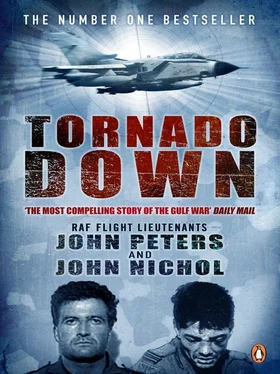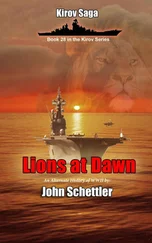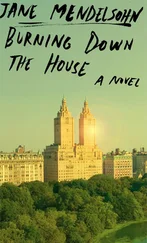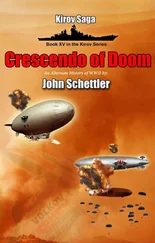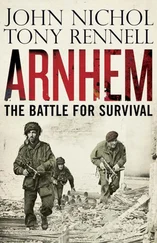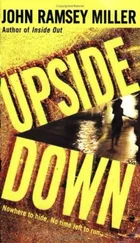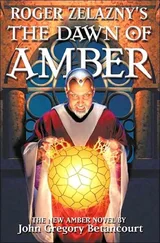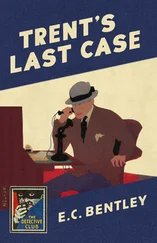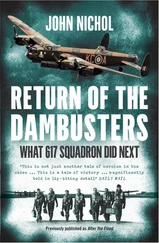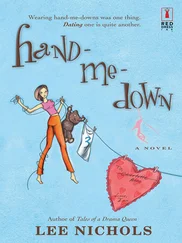‘No, no,’ he said, recoiling from it in horror, ‘that’s quite all right; you hang onto it!’, which made us all laugh again.
I was desperate to know whether John Nichol and all the others had been released, but Lunty interrupted me: ‘Look, I’m sorry about this, but we need to know…’ They all thought maybe, if they were really lucky, there would be one other missing RAF pilot or navigator still alive, but only one at the very most. Because they hadn’t heard anything about the others since the broadcast, they had assumed the worst.
‘Is John Nichol alive?’ asked Chris.
‘Yes, he’s fine.’
‘That’s fantastic news. But… is that it? I mean, are there any more?’ I could hear the tension in his voice.
‘Yes,’ I was happy to reply, ‘there’s Rupert Clark, Simon Burgess, David Waddington…’
He was bowled over. Nobody could quite believe it. Gathering round, they kept saying, ‘Are you sure, are you sure?’
‘Yes,’ I said, ‘I’m sure. I saw them all not twenty–four hours ago. They’re all alive. Some of them are a bit smashed up, but they are basically OK. They should all be over soon, tomorrow probably…’
‘That’s fantastic!’
They had been convinced that Rupert was dead, and in fact his navigator, Steve Hicks, had been killed. But no one knew for sure. True to form, the Iraqis had not released any names of captured aircrew.
The RAF had a VC-10 outside, waiting to whisk us off to Cyprus. I said goodbye to Chris, who was staying to meet the next batch of released POWs. Flight Lieutenant Rob Woods, from my squadron and my next-door neighbour at Laarbruch, turned up to escort me home, which was excellent. His brief had been to smooth my passage back to Laarbruch. They could not have chosen a better bloke for the job. What wasn’t so excellent was that as we walked towards the aircraft, I kept farting. I suddenly noticed my fellow passengers were sagging away from me in their seats, frantically waving away the fumes. Johnny Fartpants or what? Lunty had brought with him a big biscuit tin, filled with chocolates and my favourite sweeties, Liquorice Allsorts. It was the liquorice on top of everything else that had done it. As if I did not smell bad enough already.
They gave me some food in the VC-10, but I was still jammed on transmit, chattering wildly to the crew. They must have been glad when I disappeared for a while, to shave off my beard in the toilet, an act that I’d looked forward to, a symbolic act, an act of freedom.
At RAF Akrotiri, in Cyprus, there was an ambulance waiting for us, which took us straight to hospital, to begin the process of rehabilitation. We wandered into the empty ward. The first thing I wanted to do was to telephone Helen. As we walked in, Rob and I started pleading with the nurse for a beer. She was all kindness, starch and cleanliness. I was trying to be charming in my rank dishevelment, but it wasn’t working.
‘No,’ she said, ‘certainly not, it’s against the rules.’ But a few minutes later, she returned with a six-pack of the local brew.
‘Don’t tell anybody I gave it to you,’ she smiled.
It was about three o’clock in the morning, German time. But I was certain Helen would be up. She should know by now I was on my way home and would probably be celebrating. A male voice I immediately recognised as ‘Tadge’ – Flying Officer Martin Entwisle, one of the Squadron’s single men – answered the telephone.
We instantly engaged banter mode: ‘What are you doing with my wife at three o’clock in the morning?’ I demanded.
He laughed. He said that Squadron Leader John Deane was there as well, with quite a few other people – everybody was toasting my release. Having wished me all the best, he went off to find Helen.
‘Hello,’ I said, ‘it’s me.’
‘John, have you still got your balls?’ she said immediately. She sounded great. It was fantastic to hear her voice again.
‘Yes,’ I said, ‘I’m OK. Good to hear my wife is still a true English rose!’
‘Well, we did all think the Iraqis might cut them off at one time, didn’t we? Where are you?’ she asked.
‘Cyprus. I’ll be here for a couple of days, then I’ll be coming home.’
‘Everybody’s been round,’ she said. ‘We’ve got through twenty-one bottles of champagne! You’d better come home and join us.’ Helen was… Helen! – pragmatic and funny. It was a very good feeling, talking to her.
Helen told me that nobody on the station had confirmation of who was alive. So she was delighted to learn that John Nichol, Simon Burgess, Robbie Stewart and Dave Waddington were all fine. But there was one more piece of amazingly good news, which was that Rupert Clark was alive and coming home. Virtually everyone on the base was convinced that Rupert had been killed. She dashed off after ten minutes to ring the Station Commander with the news. I put the telephone down. I was sorry the children were asleep.
I called my mother and father. My brother picked up the phone.
‘I can’t be too bad,’ I said, in answer to Mark’s droll questioning, ‘I must be sane. The last time I was in Cyprus, Keo beer tasted like shit. I haven’t had a beer for seven weeks, and it still tastes like shit.’
Rob Woods lunged over and grabbed the phone from me. ‘Mark,’ he said to my brother, ‘don’t worry about John. He’s exactly the same, I can’t shut the bastard up!’
I had been up for over twenty-four hours by now, but still did not want to sleep. At about nine o’clock, I decided to give Rob a break (he was bored rigid), and went off for a bath. The attention since being freed had been gratifying, but at the same time it had annoyed me slightly: you survive prison on your force of mind – all this fussing made me feel I was weak. I took my clothes off voluntarily for the first time in seven weeks. In the mirror, I saw a stick insect. I realised why they had been fussing: they were looking at a total weakling. Normally weighing in at around 160 lb, I was now less than 130 lb. There were salt-cellars where my collarbones used to be, my stomach was hollow; my legs were so spindly you could distinguish every detail of the knee-joints. I examined my eye and the remaining bruises on my body. None of the damage looked very permanent, except possibly for the knee injury.
I climbed into the bath, my first proper bath for forty-seven days, and began soaping myself down. I did it thoroughly twice. That was just for starters. It took four heavy applications of the industrial strength medicated hospital shampoo to get the thick grime and grease out of my matted hair. After this first scrubbing, I let out all the dirty bath-water and cleaned the scum from the sides of the tub. Drawing a fresh bath, I lay back, lazing in the luxury of the steaming hot water. Bliss. Then I climbed into the cool, crisp, blue cotton hospital pyjamas. I felt almost clean.
When I got back to the ward, Rob was sitting in the middle of a pile of national newspapers, spread out around him on the bed. I stood stock still in the middle of the room when I saw what was on all the front pages. My own face was looking back at me. It must have been taken off the first Iraqi television broadcast, I realised, looking more closely. ‘Crikey!’ I thought. It was flattering that our story was ‘news’. But the feeling of excitement wore off as the days went by. Over the next few weeks that attention would become more and more worrying.
The rest of this day was taken up with more medical examinations. Spinal X-rays revealed ‘wedging’ – two of my vertebrae had been crushed together, an injury they thought I had probably sustained during ejection from the Tornado. But the long-term prognosis, and the good news, was that I would be OK after intensive physiotherapy on my leg and back. The damaged knee, which was still giving me gyp, would return to normal use in time. I should certainly be able to fly again. This was a major weight off my mind.
Читать дальше
